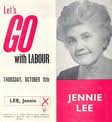Michael Young’s vision? Harold Wilson’s pet?
Tuesday, December 7th, 2010 On his blog Labour Party activist Paul Richards argues that modern Britain has been shaped by the movements and institutions that Michael Young (1915-2002) inspired. Young, he suggests
On his blog Labour Party activist Paul Richards argues that modern Britain has been shaped by the movements and institutions that Michael Young (1915-2002) inspired. Young, he suggests
added to the sum of civil society by launching new entrants to it. By empowering individuals through new forms of organization, he hoped to build new forms of egalitarian community… Young’s ideas were often the spark, but his gift was to be able to cut loose his creations as fast as possible, and allow new people to take over. He launched ships; he didn’t captain them.
While a recognition of Young’s enthusiasm to broaden educational opportunities is welcome, there may be some who will take issue with Paul Richards proposal that The Open University is one of a number of institutions which ‘owe everything to Young’s vision’. (more…)


